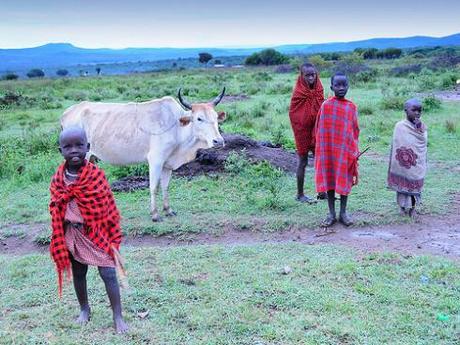
Photo by VsmithUK (Flickr) some rights reserved
by Oliver Kelly Dean
In late March 2013 it was announced that ‘the government of Tanzania is establishing a corridor of 1,500 sq Km for both public and international interests’. The “international interests” are the United Arab Emirate’s Otterlo Business Corporation Ltd (OBC) that plans to use the land for big game hunting. The purpose of this project has been introduced under the noble banner of “conservation” but in reality the plan is for the land to be used to create yet another location for rich Arabs to hunt big game. Putting aside the obviously disgusting sport of hunting animals: the forced eviction of the Maasai people from their own land is defined as a crime against humanity and ethnic cleansing by both United Nations (UN) and the International Criminal Court (ICC). This collaboration of east-African governments and corporate colonialists that is sweeping the continent – as foreign empires did previously – must not continue to be permitted.
Since 1992, the Maasai in Loliondo (Northern Tanzania) have been fighting to prevent their land from being stolen and used by members of the United Arab Emirate’s (UAE) royal family. Now OBC, with co-operation of the Tanzanian government, are taking a further 600 square miles of land to establish a wildlife corridor for “conservation” purposes. The proposal is, that by taking this land from the Maasai and banning them from using it for cattle grazing, it will allow wilder beast to roam freely between wildlife reserves. However, this is simply a misdirection in order to try and get the public and NGO’s on side.
The Maasai people of Loliondo ‘have already been removed from much of their lands in the name of conservation’ but this latest attempt to take even more land will result in the displacement of 30,000 Maasai people. These thefts of land have ‘brought poverty to the majority of Maasai’ and this further attempt to take even more could result in the ‘end of the Maasai’ in Loliondo. This would cause the Maasai people to join the growing numbers of ‘conservation refugees’.
These under-reported refugees have become the dark and untold story of the climate change crisis. The Maasai, who still get 90% of their livelihoods from Cattle grazing, are accused of damaging the environment despite living in harmony with the environment long before the industrial revolution began.
In 2009, living conditions for the Maasai people in Loliondo became unbearable when 3,000 people were brutally evicted from their homes leaving them without ‘food, water or shelter’. Tanzanian riot police burnt eight Maasai villages to the ground and raped several Maasai women. After the 2009 raid on Maasai villages, five people were arrested and imprisoned for sixth months without legal representation or bail. Regardless of situation or crime every person is guaranteed the right to a fair trial and proper legal representation under the Universal Declaration of Human and Peoples’ Right that Tanzania has signed and ratified. It is up to the International community (the UN) to hold the Tanzanian government and OBC accountable for these gross breaches in international law.
Beyond the initial international law violations comes the climax of injustice: the violation of the UN Declaration on the Rights of Indigenous Peoples (UNDRIP). Here we see that the treatment of the Maasai people in Loliondo violates multiple articles of the declaration that the Tanzanian government has signed. This is especially abhorrent because this convention was specifically designed to stop situations like this from arising. Specific violations of the declaration include article 8 (section A, B and especially C), which states that ‘Any action which has the aim or effect of dispossessing them of their lands, territories or resources’ is a violation. Article 10 takes this further by clearly stating that ‘indigenous peoples shall not be forcibly removed from their lands’. One infraction of the Declaration would be enough to class the Tanzanian government’s actions in breach of international law; currently they are in breach of five articles contained in the UNDRIP.
Overall, these breaches of different treaties of international law culminate in a clear violation: any expulsion of a people from their lands including violence and humiliation towards the population (as was seen in 2009) is considered ethnic cleansing. International Law is indeed a ‘pitifully weak tool’ (Noam Chomsky, How the World Works) against the world’s most powerful states but Tanzania does not fall into this category. The UN should enforce the laws it was founded on in order to stop these disgraceful injustices being further inflicted on the Maasai people of Loliondo.
If you would like to read more of Oliver’s work you can find most of his articles here: www.OliverKellyDean.com

